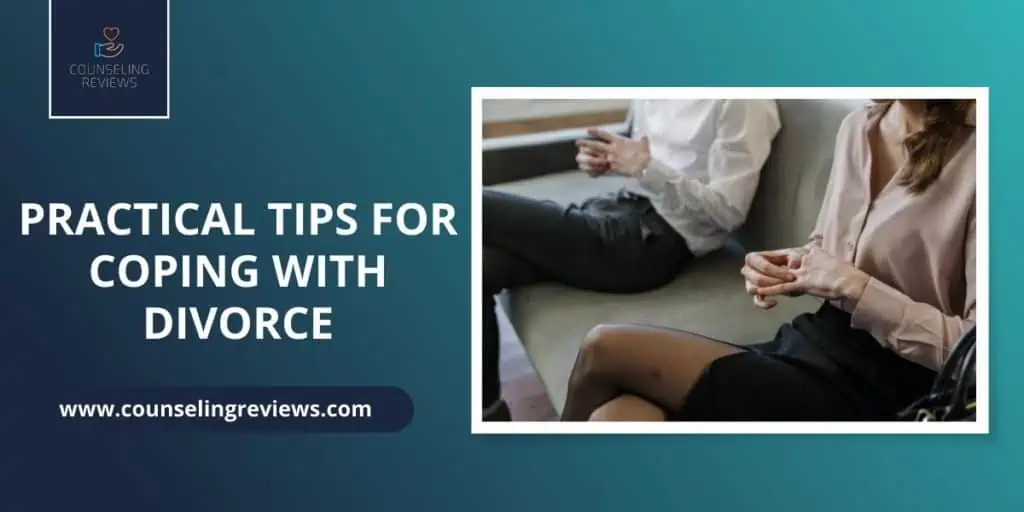Divorce is stressful, and people often grieve over the painful feelings of loss of their former relationship. The feeling eases with time and most divorced couples go on to lead happy lives. Divorce can be the most challenging and stressful experience you’ll ever endure. You have to adjust which probably impacts your finances and perhaps even changes your housing situation.
If the couple has children, you may feel sad you’re suddenly making co-parenting decisions with your ex-partner. Separation and divorce stress can leave you feeling emotionally drained. But if you don’t deal with negative emotions the consequences can begin to slowly affect you in deeper ways.

Nowadays, divorce is very normal in modern times and sometimes marriages don’t work. As time goes you likely know that getting divorced was for the best. Coping with divorce is easier if you approach things in a positive attitude and the right way. You can also check out these marriage and divorce counseling tips to help you save your marriage
In this article, we will discuss the following ten steps for coping with divorce. This will allow you to move forward instead of feeling sad and stuck living in the past. You’re going to be able to get through this phase and feel better.
Acknowledge your feelings:
The first step you should take is to take time to acknowledge your feelings. If you’re recently gotten separated, then things might be too fresh to think about grief process and moving on. Most people don’t know how to deal with negative feelings in these situations and start to feel better in a few days once you’ve thought things through in all likelihood.
People often struggle to deal with divorce or getting divorced because they won’t acknowledge their feelings. If you have a wall of emotions, then you are harming yourself. Separation is a difficult subject to think about but is something that you can’t avoid.
You should be honest with yourself and don’t think of everybody else in your life. People will know that you’re emotional and upset during this time.
Take care of your Kids:
If you have children with your ex-partner, it’s important to do everything to take care of them. You never want your kids to have divorced parents. Kids don’t understand terms like divorce or separation.
It’s up to the parents to make sure they feel safe while you’re adapting to the new normal relationship. read more about online counseling for kids
In a few cases, joint custody works out nicely, and you can be a good parent of your child even after the divorce is finalized. Divorced parents need to be cordial to one another for their kids.
Get rid of Ex-Partner Stuff:
You should avoid your ex-partner stuff sitting around your home. It’s going to hurt you. You should do things to get rid of your ex-spouse belongings.
Coping with divorce isn’t easy if you constantly remind your ex-spouse belongings around your home. You should call your ex-partner and ask her to get her stuff as soon as possible. Otherwise, it’s going to be sagacious to get rid of belongings.
Sometimes old items that you used to share in your home can be problematic. Some people find it healthy to get new stuff. That could be your furniture or other decoration material. After separation, you want to start a new chapter in your life and you want to feel like you’re having a fresh start.
Spend time with friends:
Spending time with friends helps you to relax your mind from separation. People going through divorce negotiations need emotional support for these issues. It’s a tough time and coping with things won’t be simple if you don’t have solid a support group.
You need people who care about you in your surroundings and who are willing to help you feel better when you’re down.
You can go out and enjoy life, and have fun with your friends and family that you care about when it’s possible to do so. Some people might not be able to go out and have fun things due to life responsibilities, but a bit of social time can relax your mind.
Surround yourself with Family:
Family plays an important role when you’re dealing with divorce. You can have family members to help you get through whatever problems you’re facing. Some people need to stay with extended family while divorce negotiations are going on (online divorce counseling).
Going through these times can be vulnerable. People who love you will help you to realize that everything is going to be okay. You can be able to cope with this situation if you have the right support system in place.
Hobbies can Help:
Hobbies are excellent for those who can relax their mind from separation. You’ll be able to do things you like and won’t feel frazzled. Hobbies will keep you healthy and you should try to consider what types of hobbies interest you.
People have different hobbies, some learn to play a musical instrument and others might be interested in playing games like crafts, art, and sports. You should pick a good hobby and try to spend some time with it. It will be good for your emotional and physical health.
Exercise:
Exercising is a fantastic thing to do. You make sure that you’re taking good care of yourself and exercising is going to be a huge part of the equation. Take some time out of your schedule to get a bit of exercise. This will give you energy and you will feel happier in a natural way. Exercise is a type of natural antidepressant for many people and can boost self-confidence by working on your fitness goals.
Religion Helps Some People:
Religion helps certain individuals to find solace. People find it difficult where to go next in your life and this is where religion comes into play. Religious people might want to seek guidance from their faith leaders in the community.
If you’re not religious you can have a mentor for advice for a suitable alternative. You can center yourself if you’re willing to listen to advice from people who care about your wellbeing.
Start Dating Again:
People often thought about moving forward and finding someone new. Depending on how long you have been divorced, you shouldn’t try to jump into another relationship before you’re mentally prepared. It’s a positive move to find someone nice once you’re feeling good.
Getting into the relationship again is an excellent way to leave your past behind.
It is best to try casually dating instead of looking for something serious right away. There are many ways to look for singles such as meeting people through friends or support groups. For many people, this is the final step for coping with divorce.
Seek Therapy:
Seeking therapy is a good idea when you’re facing problems to get over your divorce completely. Coping with separation isn’t easy for everyone when you love someone. You might be shocked to think your marriage ended in divorce, but it’s time to look forward.
A therapist can help you by suggesting various coping mechanisms to use when you’re feeling down. Therapists deal with people who are suffering situations like this and can help you out if you’re ready.
Avoid conflict with your spouse or former spouse
Minimizing conflicts with your spouse or former spouse is crucial, even though it might sound obvious. Overcoming ingrained habits can prove challenging, especially if you’re dealing with a narcissistic ex-partner. However, it’s important to recognize that engaging in conflict is unlikely to benefit either of you at this stage.
It’s wise to keep in mind the significance of taking calming breaths, disengaging when necessary, and most importantly, not allowing your former partner to introduce more turmoil or evoke intense emotions in your life.
Self-reflect
Engaging in self-reflection holds immense value. Whenever one undergoes a significant change in life events or transitions, dedicating time and effort to contemplate both the positive and negative aspects of the experience proves beneficial. Consider the following points:
-
Examine your role in the relationship.
-
Identify areas for personal growth stemming from the experience.
-
Glean insights about yourself and your interactions within relationships.
-
Evaluate any potential regrets.
-
If regrets exist, strategize how to approach future relationships differently.
-
Assess the need for any necessary apologies.
-
Address any lingering resentments.
-
Develop methods to release these resentments.
You might uncover positive recollections from the early stages of your marriage. Concentrating on the favorable aspects that emerged from the relationship—such as children, cherished memories, and lasting friendships—can facilitate the release of unfavorable sentiments.
Don’t be hard on yourself
Be gentle with yourself. Keeping the right perspective is crucial, especially when you’re navigating the challenges of dealing with a divorce. If you’re carrying feelings of guilt or shame about the marriage ending, remember that a relationship involves two individuals – both in its creation and its conclusion.
It’s natural for guilt and shame to emerge during the various emotional stages’ of going through a divorce. However, offering yourself forgiveness could be a way to release any regrets or culpability you might be holding onto in this trying period. This approach can effectively aid you in progressing towards your new life.
Regardless of the events that transpired during the marriage, it’s essential to find ways to cope emotionally with the divorce; otherwise, moving forward becomes a challenge. Grant yourself forgiveness and allow the necessary time and space for your healing, enabling you to embark on the next chapter of your journey.
Wrapping UP:
Dealing with divorce is a devastating emotion. Coping with a stressful major life event alone is possible, but with the above-mentioned tips, you can learn to move and recover from your divorce. You can seek help from a mental health professional if you find it affordable. You have options and great help that you can count on during a tumultuous time in your life.
Coping With Divorce FAQs
The most stressful part of divorce often includes emotional turmoil, financial concerns, custody battles, and legal complexities. Coping with the end of a relationship, dividing assets, determining child arrangements, and navigating the legal process of divorce attorney can all contribute to heightened stress levels during this challenging life transition.
Divorce is emotionally challenging due to the dismantling of a shared life, loss of companionship, disrupted routines, and often feelings of failure and rejection. It involves grief, adjustment, and a shift in identity. Complex emotions like sadness, anger, and fear can make the grieving and healing process deeply difficult.
The emotional toll of divorce is often the toughest aspect. Coping with the loss of a partnership, dealing with loneliness, and adjusting to life changes can be incredibly challenging. The process also involves legal complexities, financial adjustments, and potential custody issues, adding to the difficulty of moving forward.





